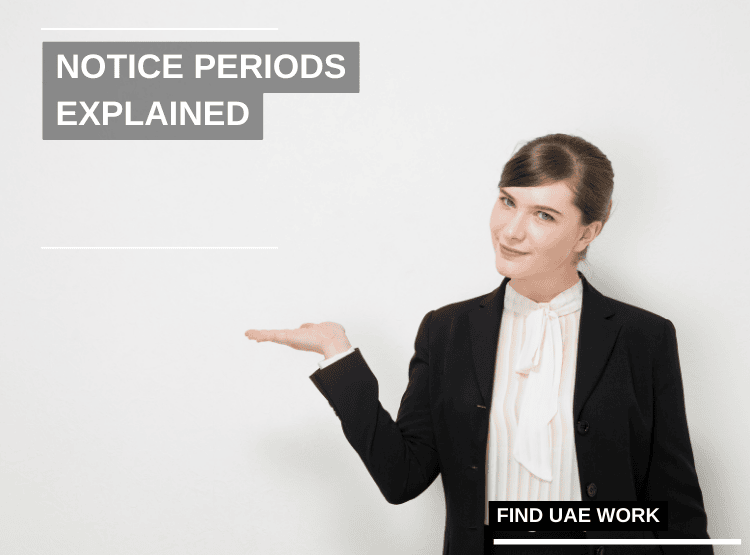When leaving your job in the UAE, it’s important to understand the concept of a notice period. Just like any other contract, your employment comes with certain rules, and one of the most critical aspects to consider is the notice period. This period allows both you and your employer time to prepare for your departure, ensuring a smooth transition. In this guide, we’ll explain everything you need to know about notice periods in the UAE.
What is a Notice Period?
A notice period is the time you and your employer must give each other before ending the employment relationship. It’s a predefined period that helps the employer find a replacement for you and allows you time to transition out of your role. Understanding how it works is essential to ensure a smooth exit process.
Typical Duration of a Notice Period
The length of your notice period in the UAE can vary depending on several factors:
- During Probation: Notice periods are generally shorter, often ranging from 1 to 2 weeks.
- After Probation: For most employees, the standard notice period ranges from 30 days to 3 months.
- Special Circumstances: Senior-level roles or employees with specialized skills may have longer notice periods. Always check your contract for specific terms.
It’s important to note that different roles or contracts may have varying notice periods. Make sure to review your employment contract carefully.
Types of Employment Contracts and Notice Periods
In the UAE, there are different types of employment contracts, and each comes with its own rules for notice periods:
- Limited Contracts: These contracts have a fixed end date. Notice periods for limited contracts are typically clearly defined in the agreement. If no notice period is mentioned, the general expectation is a two-week notice.
- Unlimited Contracts: These contracts do not have a fixed end date. For unlimited contracts, the typical notice period is between 30 days and 3 months. The exact duration depends on your position, experience, and the terms of your contract.
- Part-time and Temporary Contracts: The notice period for these contracts is more flexible. It usually depends on the length of the contract, the nature of the job, and any clauses specified in the contract.
What to Expect During Your Notice Period
Both employees and employers have responsibilities during the notice period. Here’s what you need to know:
Employer Responsibilities:
- Salary Payment: Your employer is required to continue paying you your full salary during the notice period, including any benefits you’re entitled to.
- No Retaliation: Employers cannot take any disciplinary action against you simply for resigning. They are also expected to treat you fairly during this time.
- Provide Necessary Documents: Upon request, your employer must provide you with necessary documents like an employment certificate, salary slips, and a reference letter, which could be helpful for future jobs.
Employee Rights and Obligations:
- Fulfill Your Duties: You are expected to continue working diligently during your notice period. You should complete your tasks and help with the transition, unless otherwise agreed upon with your employer.
- Receive Salary and Benefits: During the notice period, you’re entitled to receive your full salary, and any benefits like annual leave or gratuity (depending on your contract) must be provided.
- Protection Against Discrimination: You have the right to be treated fairly during the notice period. Discriminating against you for resigning or leaving is against the law.
Early Termination of the Notice Period
Sometimes, you might want to leave before completing the notice period. Here are a few things to consider:
- Employee’s Right: If you wish to leave before completing your notice period, you must inform your employer. Your employer can choose to either:
- Allow you to leave early without any penalty, or
- Deduct the remaining notice period from your final pay.
- Employer’s Right: On the other hand, your employer also has the option to terminate your contract immediately, but they must compensate you for the remaining notice period.
Consequences of Not Serving Your Notice Period
Leaving your job without completing the notice period could have consequences. Employers may deduct the unpaid portion of the notice period from your final settlement. It’s always best to communicate openly and work out a solution with your employer before making any decisions.
Conclusion
Understanding the notice period is essential for both employees and employers in the UAE. By knowing the rules and regulations, you can ensure a smooth transition when ending your employment. If you’re considering resigning, make sure you check your employment contract to see the required notice period and communicate clearly with your employer.
Frequently Asked Questions (FAQs)
1. What is the typical notice period for unlimited contracts in the UAE?
For unlimited contracts, the notice period is usually between 30 days and 3 months, depending on the specific terms of your contract.
2. Can the notice period be waived?
Yes, the notice period can be waived if both you and your employer agree in writing.
3. Do I get paid during the notice period?
Yes, you must receive your full salary and any applicable benefits during your notice period.
4. What happens if I leave without completing the notice period?
If you leave before completing your notice period, your employer may deduct the remaining days from your final pay.
5. Can my employer terminate my contract immediately during my notice period?
Yes, your employer can terminate your contract at any time but must compensate you for the remaining notice period.
6. Can I negotiate my notice period?
In some cases, yes. You can discuss the possibility of shortening or extending your notice period with your employer, but this must be mutually agreed upon.
By understanding notice periods, fulfilling your responsibilities, and maintaining open communication, you can ensure a smooth and professional exit from your current job. Stay informed, follow the rules, and you’ll have a successful transition to the next phase of your career.
- UAE WORK-Urgent Hiring: Pakistani Return Mixer Heavy Drivers for Saudi Arabia - February 28, 2025
- UAE Work -Office Assistant Job in Dubai – Apply Now! - February 27, 2025
- UAE Work Haram Sharif Cleaner Jobs in Makkah – 15 Vacancies Available - February 26, 2025
Important Notice: Genuine employers will never ask for payment during the job application, interview, or hiring process. If someone requests payment for job applications, tests, or interviews, it’s likely a scam. Protect yourself by staying cautious and reporting any suspicious activity immediately. Stay vigilant and safeguard your career!

